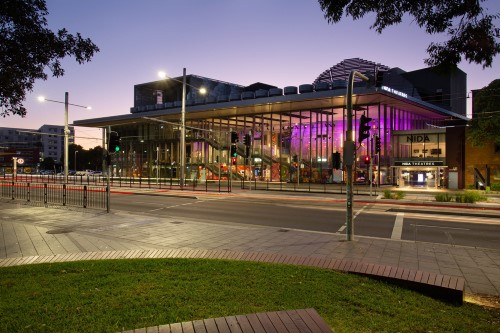NIDA CEO Liz Hughes has warned that a UNSW proposal for more than 800 new student rooms opposite the university’s main entrance poses a “grave and serious threat” to her institution’s future via costs that represent more than a third of its annual budget and the forced closure of several teaching theatres.
In May 2023, UNSW lodged a Development Application for the redevelopment of the UNSW Western Car Park on Anzac Parade, proposing 1,066 rooms across five buildings, the tallest of which were 20 and 23 storeys.
Following feedback from Randwick Council and the Sydney Eastern City Planning Panel, the proposal was amended so that the tallest buildings were 15 and 16 storeys, and the site comprised 881 rooms.
According to NIDA, UNSW has or will receive a $168 million payment from property giant Iglu for a 99-year lease of the site which is directly next door to NIDA and is currently used as a car park. The proposed development includes commercial and retail premises.
Sydney Eastern City Planning Panel, headed by former NSW Government Minister Carl Scully, is expected to approve the development at a meeting on Tuesday, August 6, despite Randwick Council refusing it this week because it was “excessive in bulk and scale”, “contrary to the public interest” and “inconsistent with the existing and desired future character of the locality”.

Hughes has called on the panel to defer its decision and refer the development application to the NSW Planning Minister Paul Scully for further consideration to protect the viability of NIDA.
“NIDA is facing a grave and serious threat to its future if this development goes ahead in its current form,” she said.
“We have tried, and failed, to have the UNSW listen to us and now we implore the Sydney Eastern Planning Panel to consider the damage this development will do to one of Australia’s most respected and valued educational institutions.”
Among NIDA’s objections are that the development will take away the adjacent drop-off zone for visitors, and there will be no car parking close to NIDA for any students or visitors during the 3-5 year construction.
The institution also claims construction will force the closure of teaching theatres, and music and sound studios, with five floors of specialised studio and performance spaces used for learning, including for Master of Fine Arts students, which will need to be relocated due to sound and vibration from drilling.
NIDA’s objections to the proposed development has won the support of high-profile NIDA alumni, including actors Richard Roxburgh, Heather Mitchell, Sigrid Thornton, and Rob Collins.
Hughes said the impact of the proposed development on its operations is estimated to cost NIDA $11.4 million in the first 12 months alone – more than a third of its budget, with the construction costs being in the tens of millions.
“The future for NIDA is dire if this development is allowed to go ahead,” she said. “We are a not-for-profit organisation dependent on the revenue we generate from our classes, courses, and performances.
“The damaging impact of this development will hurt our students, our staff, and the 100,000 members of the community who visit NIDA each year. We recognise the need for student housing however it can’t be at the expense of NIDA’s ability to operate.”


